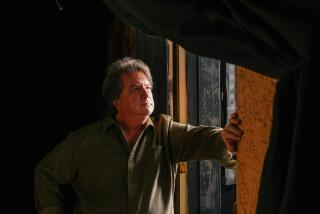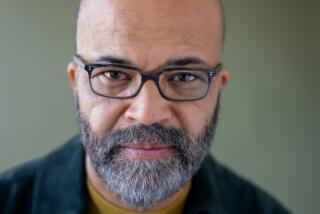Craig Wright takes the director approach
Toilet pail in one hand and cup, dish and spoon in the other, Craig Wright hovers near a wooden platform that represents a tiny prison cell in his play “The Unseen.”
Kneeling on the platform is Darin Singleton, who portrays Wallace, one of two inmates struggling to make sense of a hellish world in which the pain of constant torture is matched only by the anguish of being punished for unknown crimes.
A buzzer sounds, and Wright places each object in a corner of the cell.
“Maybe start like this,” he says.
A second buzzer prompts him to shift everything to the left, a ritual he repeats several times before declaring himself to be satisfied -- for now. “I know this is driving you crazy,” he says. “It’s driving me crazy too.”
Wright -- who is making his directing debut -- and Singleton have spent a half-hour arranging and rearranging Wallace’s utensils during a recent rehearsal for “The Unseen,” which opens Friday at the Road Theatre Company in North Hollywood.
There is, Wright will explain later, a method to the madness. But for now, we might presume that he is just being as meticulous about staging a show as he is about writing one. Wright is known for carefully crafted plays -- sometimes lyrical, sometimes brutal -- in which human nature runs afoul of cosmic forces such as love, faith and fate. He often tempers the heavy stuff with very dark comedy -- a combination that also serves him well in Hollywood, where he worked on “Six Feet Under,” “Lost” and “Brothers & Sisters” before creating the juicy family dynasty saga “ Dirty Sexy Money.”
“DSM’s” two-year run on ABC is ending this summer. But that’s not why Wright, who turns 44 on Monday, decided to try directing. “This is hardly a good time,” he says, noting that he’s serving as a consultant for Showtime’s “United States of Tara,” finishing a project for the BBC and preparing to premiere plays in Portland, Ore., Chicago and New York.
“I had seen a lot of productions of ‘The Unseen,’ ” he says. “All of them have been very satisfactory, but they left me saying, ‘I wish I could do this or that.’ ”
Last year, the Road presented a widely acclaimed version of Wright’s “Lady,” a politically charged tale about three buddies on a hunting trip. When the theater asked if it could mount his 2007 drama, “The Unseen,” he said, “Let’s do it,” then added, “but I want to direct.”
The Road was happy to oblige. Scott Alan Smith, who directed “Lady,” and his wife, Elizabeth Sampson, are assisting Wright -- although, says Smith, “Craig’s been handling things beautifully, including the technical stuff, which he thought he’d need help with since he’s used to dropping in on a show and not staying for the day to day.”
In working with the actors and designers, Wright is pursuing what he calls a “communitarian” approach. “More than anything I’m trying to be present and open,” he says. “I listen respectfully and try to respond creatively.”
He begins each rehearsal with a moment of silence designed to clear everyone’s mind of the day’s distractions. One recent Wednesday night, he showed up looking sharp in a crisp gray suit -- he owns eight of them -- despite having gotten up at 5 to work on a play before heading to the “Tara” lot.
Within minutes, the coat came off, the shirt sleeves were rolled up and Wright was bouncing between his front-row seat and the Road’s cozy stage, where he consulted with the cast of three: Singleton (the intellectual, analytical Wallace); Matt Kirkwood (the emotional, intuitive Valdez), and Douglas Dickerman (the deeply troubled guard, Smash).
“The play’s pretty simple,” Wright says later. Wallace and Valdez have spent years in nearby cells. They can’t see each other, yet they engage in seemingly endless conversations that often turn into contests of words and wills. Their grim routine is disrupted by strange tapping -- a sign, perhaps, that someone has moved into the cell between them. Meanwhile, says Wright, “the guard who tortures them is, to quote Wallace, ‘a prisoner of his own empathy.’ It drives him crazy, torturing people. So he comes up with a plan.”
Having a writer direct his own play offers certain benefits: no need to guess at intention or motivation, for instance. However, Smith says, there are caveats too. “Craig has had to make the jump from thinking like a playwright to thinking like a director. It’s one thing to write the characters and another to move them through space onstage.”
Wright also has had to learn to step back from the material. “He knows why all the characters do what they do,” Smith says. “The actors don’t. Part of the process is discovery. There was a bit of impatience at the beginning, but now everybody understands.”
Inside knowledge
Singleton says he’s never worked with anyone who has “such an expansive and, almost simultaneously, an intimate knowledge of the play at hand. Craig’s vision runs from the macro to the micro. . . . It’s interesting to watch how he tries to translate that substantial wealth of information into bite-sized chunks for us to wrap our brains around.”
“Craig sees the world from a very different perspective,” Smith says, “and he’s able to articulate that perspective. There’s great poetry in how he talks in his daily life. He gave a note to an actor the other day: ‘Think of it as a cloud of ironic annoyance passing over the prairie of your idea.’ It must be how it was to hang around Tennessee Williams.”
Wright, in turn, says watching the actors has taught him a lot about the dynamics between his characters. “I thought that Wallace and Smash were in conflict. But they actually are slightly in love. Not romantically. But in an unhealthy romance.”
He’s made other discoveries as he’s gone along. And he is knocking off a list of do’s and don’ts inspired by past productions: Instead of using a set with real walls, the barriers in Wright’s cells will be imaginary -- which means he must get the actors and the audience to feel comfortable with seeing what isn’t there. Despite his affinity for language (just listen to the way he and his characters talk), he is increasing the number of silences and those ominous buzzers.
Even without such changes, “The Unseen” would be a challenge to stage. It involves torturers and the tortured in a mysterious prison, so whatever goes on is not easily understood and not especially pleasant, the setting is stark and the action is confined. Reviewers have faulted some directors for overdoing the symbolism or not doing enough to animate the action.
“There is a need for specificity because there is so little onstage,” Wright explains. Each word, gesture and pause counts. Actors must be encouraged to “play against the bias.”
That’s one reason Wright focused so intently on choreographing Wallace’s handling of his utensils: “I got the idea that he devised this system for moving things around as a clock and that helps him keep track of time. When you see him puzzling out his ‘clock’ or when [Valdez] is dealing with the ‘wall,’ the play is happening. When you don’t do that, it’s just two guys talking.”
“The Unseen” grew out of Wright’s desire to write about what he calls “the limits of knowing” -- an admittedly tough subject to get one’s arms around. The former seminary student often builds plays out of “how people face interesting and intractable questions,” albeit in very different ways. “The Pavilion” (2000) is set at a high school reunion and has been compared to “Our Town” in its evocation of life’s inevitability and bittersweetness, and “Grace” (2005) reveals the mayhem that awaits a Christian couple who leave Minnesota to seek their fortune in Florida.
Wright made a similar leap -- with happier results. Nearly a decade ago, he was working for a church in St. Paul, Minn., when he received a call from Hollywood. Someone had read “Orange Flower Water,” his drama about infidelity. “They said, ‘Do you want to come out to meet Alan Ball?’ I said, ‘Sure!’ At the time, I had a wife and a son to feed. I would never have come without a job. I was lucky.”
Soon, Wright was writing for Ball’s “Six Feet Under.” He says TV has freed him to make his plays “increasingly theatrical.”
“Whatever interest I have in telling realistic stories I get to do that on television,” he says. “I also don’t have to worry about the commercial success of my plays. So, for me, the theater can be all about doing the things that only the theater can do.”
More to Read
The biggest entertainment stories
Get our big stories about Hollywood, film, television, music, arts, culture and more right in your inbox as soon as they publish.
You may occasionally receive promotional content from the Los Angeles Times.






